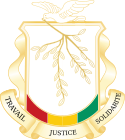 |
|---|
Guinea has had four constitutions.[1] The latest constitution was approved by referendum on 19 April 2010 and formally adopted on 7 May.[2] However, it was later dissolved on 5 September 2021, following the 2021 Guinean coup.[3]
Background
[edit]A constitutional referendum was held on 28 September 1958 as part of a wider referendum across the French Union (and France itself) on whether to adopt the new French constitution; colonies voting to accept it would become part of the new French Community; if rejected, the territory would be granted independence.[4][5] More than 95% of voters of French Guinea voted against the constitution, with a turnout of 85.5%,[6] making it the only colony to vote no.[7]
History
[edit]Guinea became an independent nation on 2 October 1958. The first constitution was enacted immediately afterward[4] and was written in some haste.[8] A 15-person commission wrote a draft constitution in 10 days, which was approved by the new national assembly on 10 November 1958 after a mere two hours of debate.[8] However, during the dictatorial reign of the first president, Ahmed Sékou Touré, it was routinely ignored or altered.[4]
In 1982, bowing to both international and internal pressure, Guinea adopted a new constitution which included better protections for human rights.[8] After Touré's death in 1984, the government was toppled by a military coup d'état. Another constitutional referendum, held on 23 December 1990, was approved by 98.7% of the voters, paving the way for a third constitution.[9]
A 2001 referendum, which was boycotted by the opposition, amended this constitution, removing presidential term limits and lengthening the term from five years to seven.[10] Critics accused then-President Lansana Conté of seeking to remain in power longer.[10]
When Conté died in 2008, Captain Moussa Dadis Camara seized power in a coup d'état, but was shot in the head in December 2010.[10] He left the country to receive medical care and recuperate.[10] He later agreed not to come back, and Guinea returned to civilian rule.[10]
The fourth constitution was approved by referendum on 19 April 2010 and formally adopted on 7 May.[11]
After the 2021 Guinean coup d'état, the military announced that they have dissolved the constitution.[12]
References
[edit]- ^ Camara, Mohamed Saliou; O'Toole, Thomas; Baker, Janice E. (7 November 2013). Historical Dictionary of Guinea. Scarecrow Press. p. 97. ISBN 9780810879690. Retrieved 21 November 2016.
- ^ "GUINEA DECRET 2010 Constitution" (PDF).
- ^ "Elite Guinea army unit says it has toppled president". Reuters. 5 September 2021. Archived from the original on 5 September 2021. Retrieved 7 September 2021.
- ^ a b c O'Toole, Thomas; Baker, Janice E. (16 March 2005). Historical Dictionary of Guinea. Scarecrow Press. pp. 53–55. ISBN 9780810865457.
- ^ "Les Constitutions Guinéennes". Archived from the original on 2021-09-06. Retrieved 2016-11-04.
- ^ "Elections in Guinea". African Elections Database. 12 November 2007.
- ^ Schmidt, E (2009) Anticolonial Nationalism in French West Africa: What Made Guinea Unique? African Studies Review
- ^ a b c An-Na'im, Abdullahi Ahmed (2013-10-09). Human Rights Under African Constitutions: Realizing the Promise for Ourselves. University of Pennsylvania Press. pp. 99–. ISBN 9780812201109.
- ^ "Guinea: Constitution of December 23, 1990". World Intellectual Property Organization.
- ^ a b c d e "Guinea profile - Timeline". BBC News. 1 September 2016.
- ^ "GUINEA DECRET 2010 Constitution" (PDF).
- ^ "Army colonel on Guinean TV says govt dissolved, borders shut". AP NEWS. 2021-09-05. Retrieved 2021-09-05.
External links
[edit]- Text of the 1958 constitution (in French)
- Text of the 1990 constitution (revised in 2003) (in French)
- Text of the 2010 constitution (in French)
- Text of the 2010 constitution, translated into English